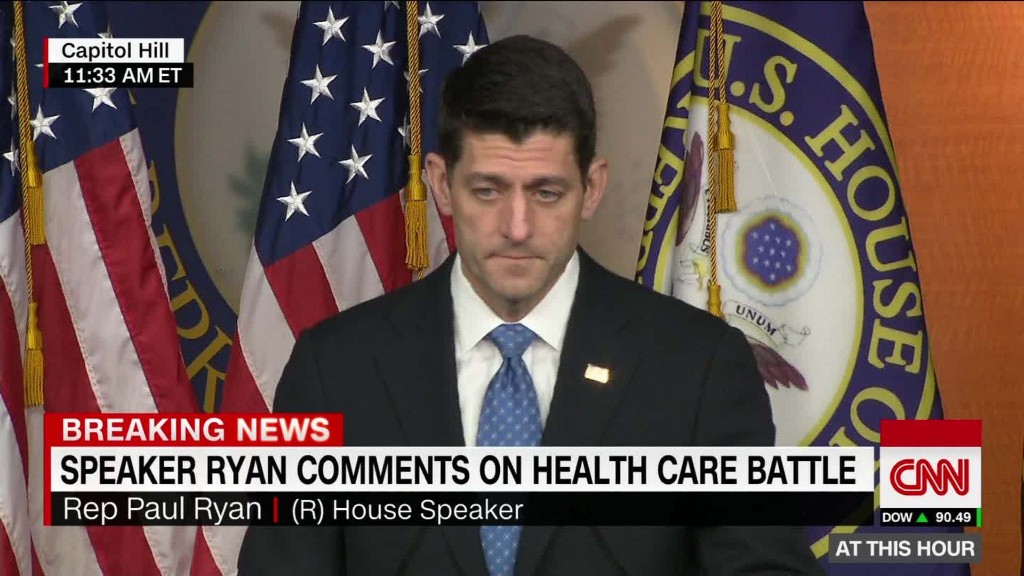
Lower health insurance premiums.
That's what's at the heart of the ongoing battle between the House Freedom Caucus and Republican leaders, particularly President Trump.
Trump is attacking the band of conservative lawmakers for torpedoing the GOP bill to repeal and replace Obamacare last week. But the Freedom Caucus reiterated Friday that it will only back legislation that does more to reduce premiums.
The caucus is right that the GOP bill, formally titled the American Health Care Act, would have done little to lower premiums for most Americans, experts say. True, younger consumers would have seen their costs drop a bit but it would have been at the expense of older folks, who would have suffered huge spikes in premiums.
The bill, as originally written, did not address the main reasons why premiums for many individual market policies rose under Obamacare: The sweeping set of consumer protection mandates it imposed on the insurance industry. Under Obamacare, insurers must cover those with pre-existing conditions, provide a comprehensive set of benefits and limit consumers' financial responsibility above a certain threshold. All of this pushed up premiums.
Related: Before Obamacare, some liked their health care plans better
(Most Obamacare enrollees are protected by federal subsidies that are based on their income and the cost of coverage in their area. Under the GOP plan, however, consumers could feel more of the pain since they would receive a tax credit that adjusts based on an enrollees' age, not by the premiums they face.)
In order to drive premiums lower, the Freedom Caucus wants to take an ax to two insurance mandates: The essential health benefits provision that requires insurers to cover benefits like maternity, substance abuse and prescription drugs, and the community rating measure, which prevents insurers from basing premiums on health status, gender or age in a specific area.
Eliminating these two requirements would likely lower premiums, but only for some consumers. And it would leave many enrollees -- particularly sicker ones -- on the financial hook for much more of their care. Also, it would allow insurers to effectively cherry pick the people they want to cover.
Without the essential health benefits measure, insurers could offer cheaper plans that don't cover as much. They would not have to pay for costly benefits, such as maternity or prescription drugs. They could also opt not to cover the treatments that patients with costly illnesses, such as cancer, diabetes and hepatitis C need.
That would work out well for young and healthy people who don't go to the doctor much. They could buy skimpy plans with low premiums.
But it wouldn't be so good for those who need care. They would need to shell out for all the services that their insurance policy doesn't cover. And they wouldn't be shielded by Obamacare's financial protections -- such as the annual limit on deductibles and co-pays -- since those would only apply to covered benefits.
"Premiums would be lower, but only because insurers would cover less, so out-of-pocket costs would be higher," said Cynthia Cox, an associate director at the Kaiser Family Foundation.
In the final hours before the GOP bill collapsed, the caucus convinced Republican leaders to weaken Obamacare's essential health benefits' measure, leaving it to the states to determine what services should be covered. But this move spooked moderate Republicans, who were concerned it would leave their constituents with less care and bigger bills, and led to the bill being shelved.
Related: Freedom Caucus leader says group holding strong against Trump
Getting rid of the community rating provision would once again let carriers base their premiums on an enrollee's health or gender. Again, healthy people would benefit from lower rates.
But young women might have to pay more since they typically use more health care services and could become pregnant. And sick people could be charged sky-high premiums commensurate with how much their treatments cost, leaving some unable to afford coverage.
Republican leaders were not willing last week to meet this Freedom Caucus demand, particularly since it conflicts with the broader GOP promise to protect those with pre-existing conditions.
"The goal of Obamacare and the [Republican plan] was to create a market that would be accessible for people with serious chronic illnesses," said Dan Mendelson, chief executive officer of Avalere Health, a consulting firm.
CNN's Lauren Fox contributed to this report.


